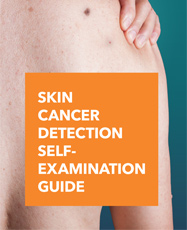Currently, there are no recommended guidelines for skin cancer screening; however, at Orlando Health, we highly encourage performing a skin examination once a month. According to the Centers for Disease Control and Prevention, skin cancer is the most common form of cancer in the United States. Notably, skin cancer also is the easiest cancer to identify and can be treated with minimally invasive procedures when discovered early on. Living in "The Sunshine State" increases all of our risks for developing skin cancer, so always protect yourself in the sun and check your skin regularly for new moles, freckles, spots and other irregularities.
Find a Doctor
If you performed a skin self-exam and see something that concerns you, please make an appointment with a dermatologist. If you do not have a dermatologist, you may make an appointment with one of our primary care doctors to receive a referral.
Insurance
Prevention and screening services are typically covered by most insurance plans. Please check to confirm your specific benefits before scheduling your appointment.
Family History
If you have a family history of any type of cancer, be sure to tell your doctor or nurse. If any of your parents, siblings or children have had cancer, you may need to be screened earlier and more often. Your doctor will talk with you about your risk factors.
We’re here to help
Screening and early detection help us treat cancer at its earliest stages. If you are diagnosed with cancer, our compassionate team at Orlando Health Cancer Institute will talk through your diagnosis, answer your questions and work with you to come up with the best treatment plan.
Screening tests are not available for every type of cancer, but our Research and Clinical Trials Program investigates new methods of detection and early diagnosis, along with state-of-the-art treatment options. For more information, visit our clinical trials.
Navigate Your Health


Find a Cancer Physician
Find a Cancer Physician
Meet our doctors who specialize in the full range of cancer care. Our team of experts has experience in a variety of specialty areas. Together, we provide comprehensive evaluation, diagnosis and treatment options.
Learn More

Patient Portal
Patient Portal
If you are a patient at Orlando Health Cancer Institute, our free online patient portal provides an easy and secure way to manage your health information. Reach us from any location at a time that’s convenient for you.
Learn More

Virtual Visit
Virtual Visit
Need to talk with a doctor, but don’t want to leave your home? Try our virtual visit (telehealth) option to connect with a physician from your phone, tablet or computer.
Learn More



